
Ground Coffee Recalled in 15 States – FDA Details
Coffee lovers in multiple states may need to check their pantries after a recall was issued for a widely distributed ground coffee due to a potential safety issue.
A popular ground coffee product has been recalled in 15 states by the FDA (Food and Drug Administration) due to a labeling error.

Coffee on a white strainer | Source: Pexels
According to the FDA website, the affected product is Our Family Traverse City Cherry Artificially Flavored Decaf Light Roast Ground Coffee in a 12-ounce (340g) bag. It was distributed by the SpartanNash Company, based in Grand Rapids, Michigan. The product bears the UPC code 0 70253 11080 1.
The recall was initiated on March 13, 2025, after it was discovered that some of the production was mislabeled as decaffeinated. Consumers may unknowingly consume caffeinated coffee, which could be harmful to individuals who need to avoid caffeine for medical or dietary reasons.

Close-up shot of ground coffee | Source: Pexels
A total of 692 cases, each containing six 12-ounce bags, were distributed across multiple states. The affected coffee reached store shelves and distribution centers across a wide stretch of the country, spanning the Midwest, South, and beyond.
Impacted states include Illinois, Kentucky, Colorado, Iowa, Indiana, Nebraska, South Dakota, Kansas, North Carolina, Michigan, Minnesota, North Dakota, Ohio, Wisconsin, and Wyoming.

Ground coffee in a glass jar | Source: Pexels
Massimo Zanetti Beverage USA, the company behind the recalled product, operates out of Suffolk, Virginia. As of now, no formal press release has been issued to inform the public about the recall.
Earlier this week, some Coca-Cola Company products were recalled after something concerning was found in certain cans. The FDA classified the recall as Class II, meaning serious harm is unlikely. At the beginning of March, the FDA announced that Coca-Cola was recalling some of its products. According to the FDA’s website, the ongoing recall was initiated on March 3, 2025.

Coca-Cola bottles and cans on display inside an Auchan supermarket in Paris, France, on January 29, 2025 | Source: Getty Images
Coca-Cola voluntarily initiated the recall, which affects products distributed in Illinois and Wisconsin. The specific item being recalled is the Coca-Cola Original Taste, 12 fl oz (355 mL) can. The UPC is 0 49000-00634 6, and the 12-can pack UPC is 0 49000-02890 4.
The recall number is F-0664-2025, with the date code SEP2925MDA and time stamp 1100–1253. According to the site, 864 twelve-count packs were recalled by the Reyes Coca-Cola Bottling Company in Milwaukee, Wisconsin. The recall was prompted after a plastic foreign object was found in the products.
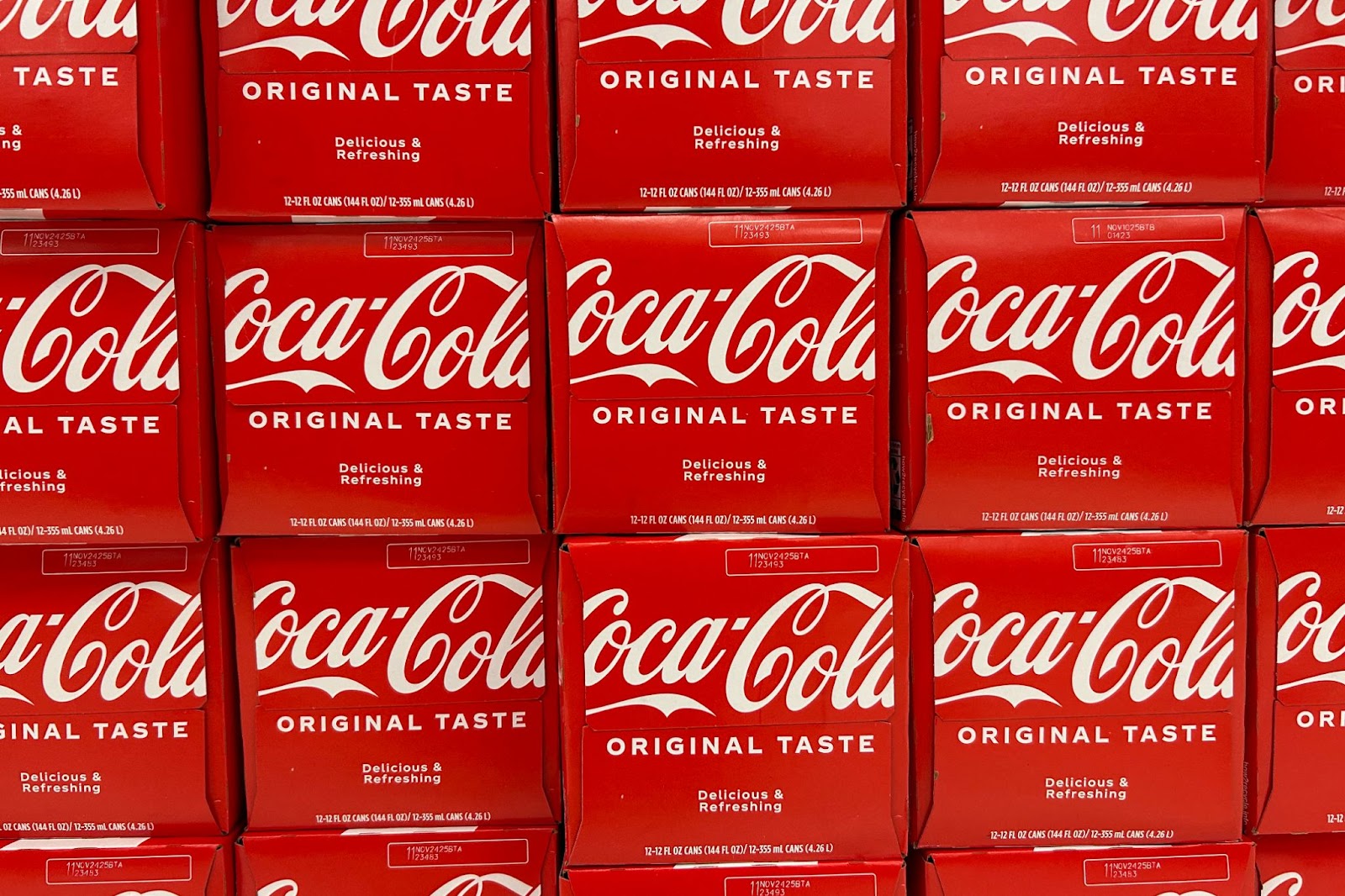
Twelve-pack cases of canned Coca-Cola sit on the shelf at a store in Stevensville, Maryland, on March 25, 2025 | Source: Getty Images
The FDA also stated that “hard or sharp foreign objects in food may cause traumatic injury.” It explained that such injuries could include lacerations and perforations of tissues in the mouth, tongue, throat, stomach, and intestine. These objects may also cause damage to teeth and gums.
Dr. Mark Fischer, regional medical director at the risk mitigation company International SOS, elaborated on the dangers of ingesting foreign objects. He said, “It can be dangerous to consume metals or other foreign objects found in food.”
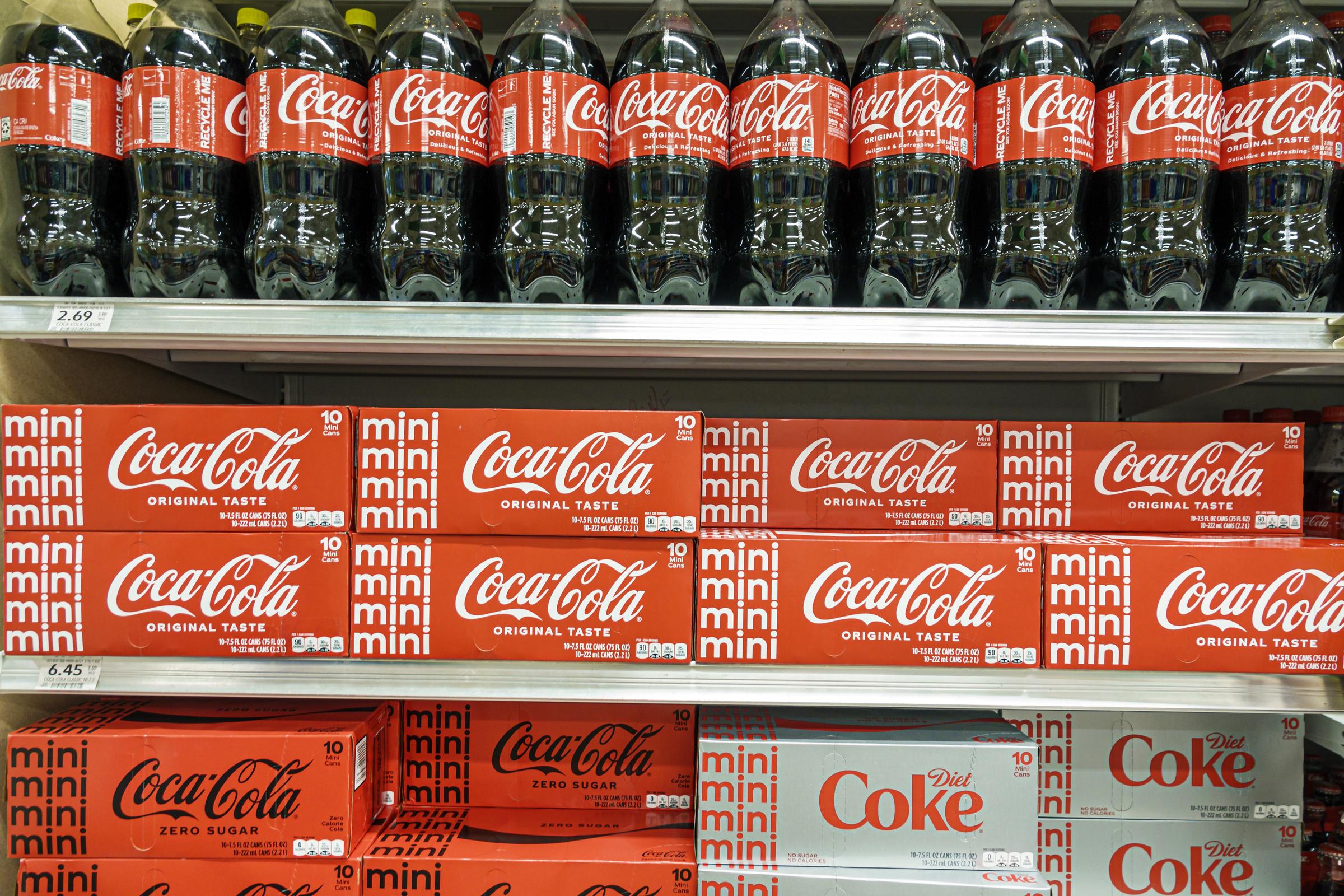
Coca-Cola products on display in mini and large sizes at a Publix grocery store in Miami Beach, Florida, on May 5, 2022 | Source: Getty Images
The medical director added, “If the metal is sharp, it can cause cuts or internal injury and may need to be removed via a surgical procedure. If you swallow any foreign objects, it’s best to consult a healthcare professional.”
The FDA classified the recall as Class II. It explained that this type of recall occurs in “a situation in which use of or exposure to a violative product may cause temporary or medically reversible adverse health consequences or where the probability of serious adverse health consequences is remote.”
Commenting on the issue, a Reyes Coca-Cola Bottling spokesperson said, “The cases are being withdrawn because they did not meet our high-quality standards. We are taking this voluntary action because nothing is more important to us than providing high-quality products to the people who drink our beverages.”
Fischer also had some insights into recalls revealing, “Recalls have been on the rise over the past couple of years.” He also shared how carrots, cucumbers, and deli meats have been recalled in the past few months for various reasons such as E. coli contamination, listeria, and salmonella.
Fischer continued, “It’s recommended that consumers ensure they are keeping up to date with news regarding recalls… Staying informed when purchasing food items is the best way to prevent foodborne illness.”
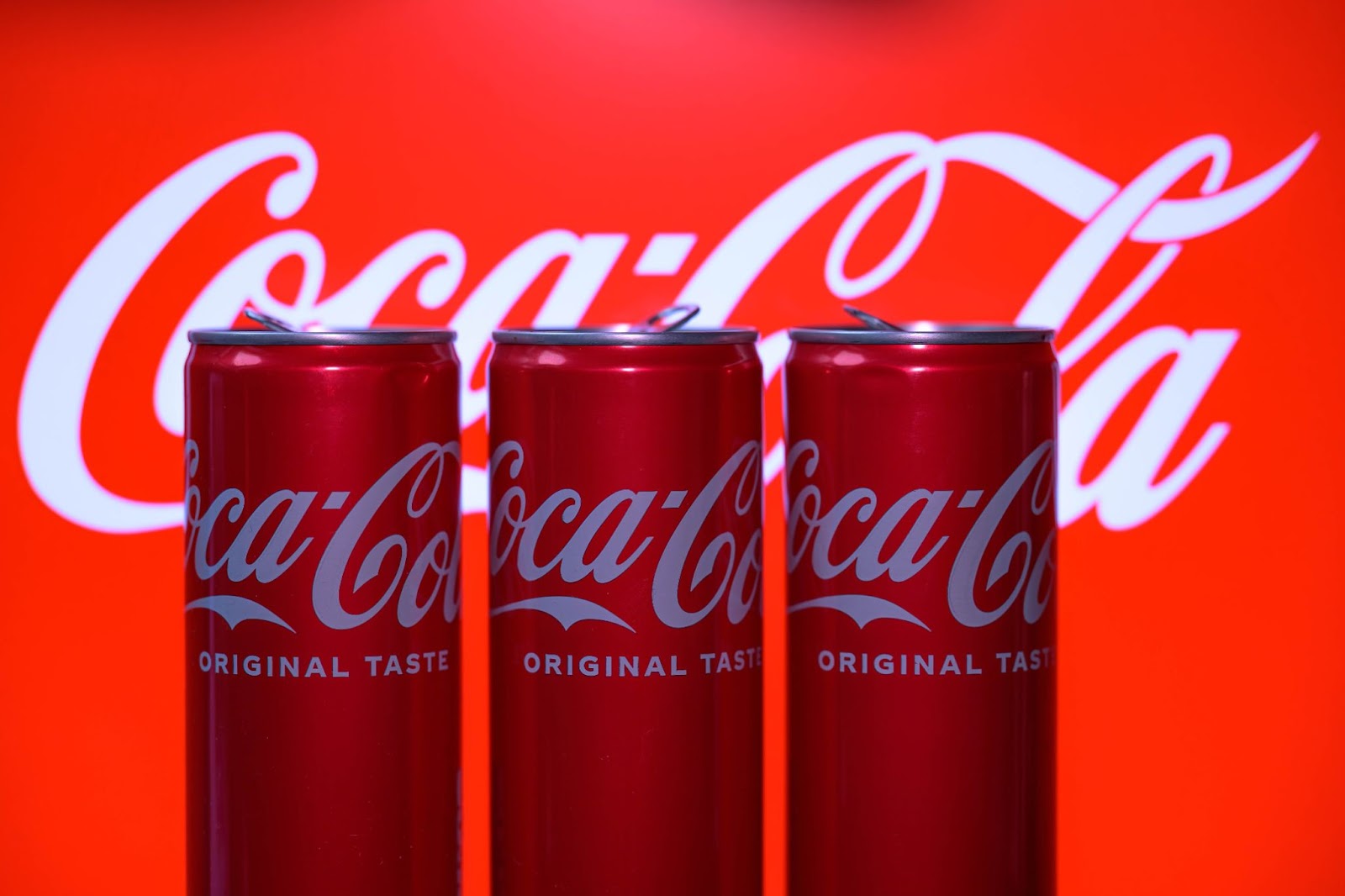
Coca-Cola cans on display with the brand’s logo visible in the background in the photo taken in Brussels, Belgium, on March 2, 2024 | Source: Getty Images
Illustrating Fischer’s point, on March 20, 2025, Idaho Smokehouse Partners, LLC, announced a recall of approximately 29,541 pounds of ready-to-eat beef stick products. The recall, done by the establishment based in Shelley, was due to possible contamination with foreign material—specifically, metal.
The Department of Agriculture’s Food Safety and Inspection Service (FSIS) announced the recall that same day. According to the agency, the affected ready-to-eat beef stick product was produced between January 13 and January 15, 2025.
Labeling indicates that the following product is subject to recall: 1.15-oz vacuum-sealed packages of “CHOMPS ORIGINAL BEEF STICK MILD.” It is marked with an expiration date of 02-10-2026 and lot code 25016.
The recalled product bears the establishment number “6220A,” which is ink-jetted on the packaging. These items were shipped to retail locations in California and Illinois.
According to Chomps, it launched an investigation after receiving two consumer complaints reporting the possible presence of metal fragments in the meat stick product. No injuries or adverse reactions have been reported.
The company initiated the internal recall as a precautionary measure. It added, “Our consumers are, and always will be, our number one priority.”
Coca-Cola, the FDA, Chomps, and the FSIS are continuing to monitor these situations closely. Consumers are encouraged to check their products and stay informed through official updates.
As per previous reports, at the beginning of the year, the FDA informed the public about recalled chicken broth sold at Walmart in nine states due to spoilage risks, with Walmart reportedly advising customers to discard it and seek a refund.
The FDA updated its website with the recall of over 2,000 cases of chicken broth sold at Walmart in nine states due to a packaging defect that may cause spoilage.

Shoppers at Walmart | Source: Getty Images
According to the FDA’s enforcement report, the product was a “Great Value, Chicken Broth, 48 oz. , Aseptic paper cartons, 6 retail units per case, 120 cases/pallet.” The reason for the recall was due to a “Potential for packaging failures that could compromise the sterility of the product, resulting in spoilage.”
The affected cartons were labeled with a “Best Used By” date of March 25, 2026, a batch or lot code of 98F09234, and the following Universal Product Codes (UPCs): 007874206684 for retail units and 078742066844 for cases.
Tree House Foods Inc., the manufacturer, voluntarily recalled the product on December 11, 2024. The company reportedly distributed 2,023 cases to 242 Walmart stores across nine states: Alabama, Arkansas, Georgia, Louisiana, Missouri, Mississippi, Oklahoma, Tennessee, and Texas.
According to the FDA’s report, Tree House Foods notified consignees of the recall by telephone. The recall remains ongoing, and the company has not issued a press release.
Walmart reportedly removed the affected products from its shelves immediately after learning about the issue. In a statement to USA Today, Walmart said, “The health and safety of our customers is always a top priority.”
Their statement continued, “As soon as we were made aware of the issue, we took action to remove all impacted (products) from … select, impacted stores. We are continuing to work with the supplier to investigate.”

Shoppers looking for products inside Walmart | Source: Getty Images
Walmart advised customers who purchased the product not to consume it and to dispose of it immediately. Customers could also request a full refund.
This was not the first time a Great Value product faced an FDA recall. Last year, Great Value 100% Apple Juice, sold in 8-ounce plastic bottles in six-packs, was recalled because the “Product contains inorganic arsenic above action level set in industry guidance (13.2ppb).”
The voluntary recall, initiated by Refresco Beverages US Inc. on August 23, 2024, was classified as a Class II recall by the FDA and affected 9,535 cases distributed to retail locations in 25 states, including Alabama, Florida, New York, and the territory of Puerto Rico.
On September 13, 2024, Refresco Beverages issued a statement explaining that the recall was initiated “out of an abundance of caution.”
The company stated that it became aware that certain lots of its apple juice, made with supplier-provided concentrate, contained inorganic arsenic levels slightly above the FDA’s 10 parts per billion (ppb) action threshold.
The company assured consumers that no incidents had been reported and encouraged consumers to check the FDA’s recall list for more information. The recalled apple juice, marked with a “Best if Used by DEC2824 CT89-6” code, remains under an ongoing recall.
A similar situation occurred with a popular chip brand, which was also subject to an FDA recall. On December 16, 2024, Frito-Lay published a bulletin on their website announcing the recall of select 13 oz. bags of Lay’s Classic Potato Chips. The recall followed an alert from a consumer.

A photo of a bag of opened Lay’s Classic chips taken in Tiskilwa, Illinois on April 17, 2019 | Source: Getty Images
Frito-Lay’s recall specifically targeted bags of chips that contained undeclared milk, posing a serious risk to individuals with milk allergies or sensitivities.
The company confirmed that the affected products were distributed to selected retail and e-commerce locations in Oregon and Washington and noted that customers could have purchased these chips as early as November 3, 2024.
Thankfully, the recall notice stated that no allergic reactions linked to the chips had been reported at the time.
However, it advised consumers to remain vigilant and check the product specifics, including a “Guaranteed Fresh” date of February 11, 2025, UPC 28400 31041, and manufacturing codes 6462307xx or 6463307xx, and discard the chips immediately if they had a milk allergy.
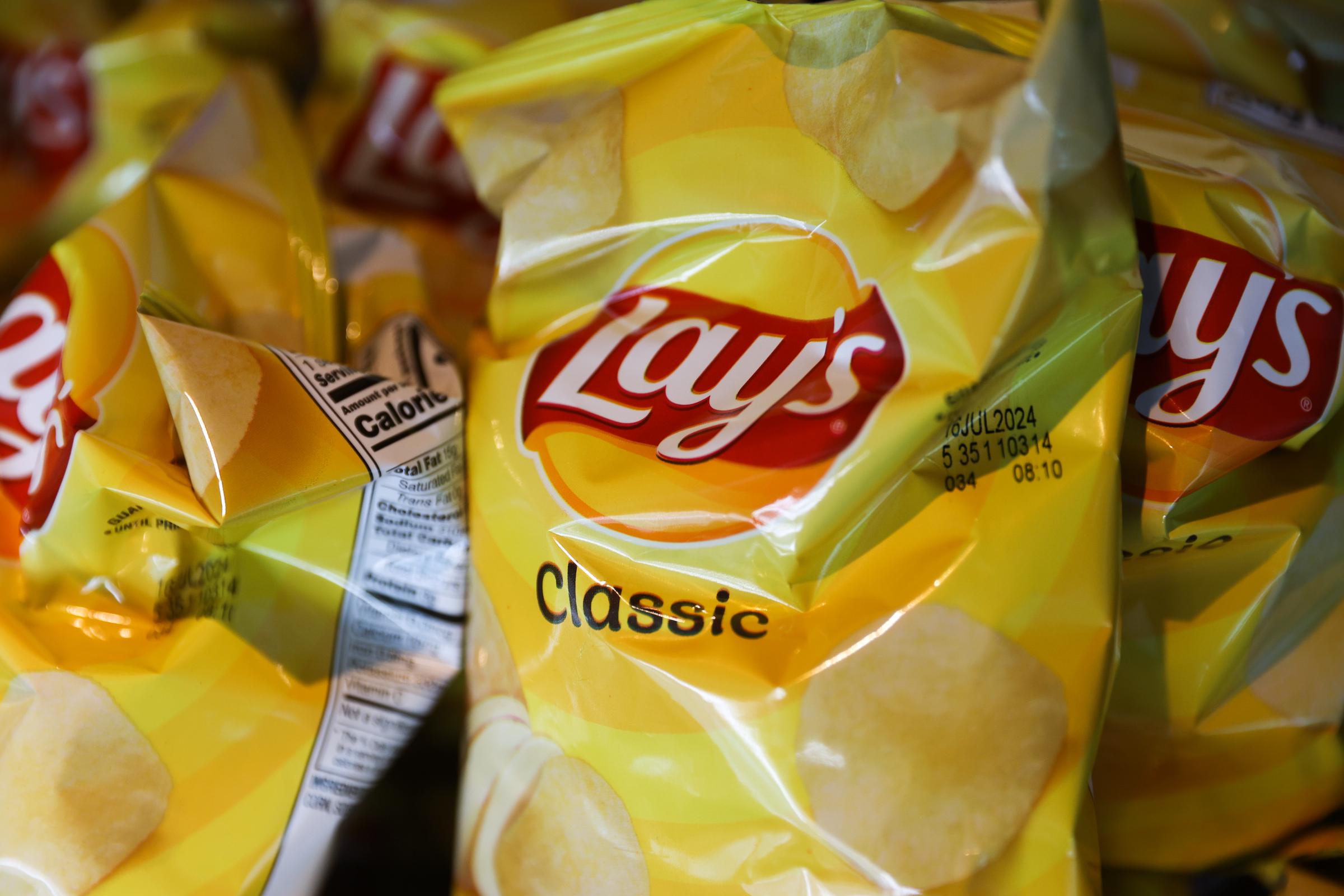
A photo of Lay’s Classic chips taken in Miami, Florida on May 2, 2024 | Source: Getty Images
A representative for Frito-Lay confirmed the recall details in a statement to Newsweek, emphasizing the company’s commitment to transparency and consumer safety.
In their comment, the representative also clarified that no other Lay’s products — including flavors, sizes, or variety packs — were involved in the recall.
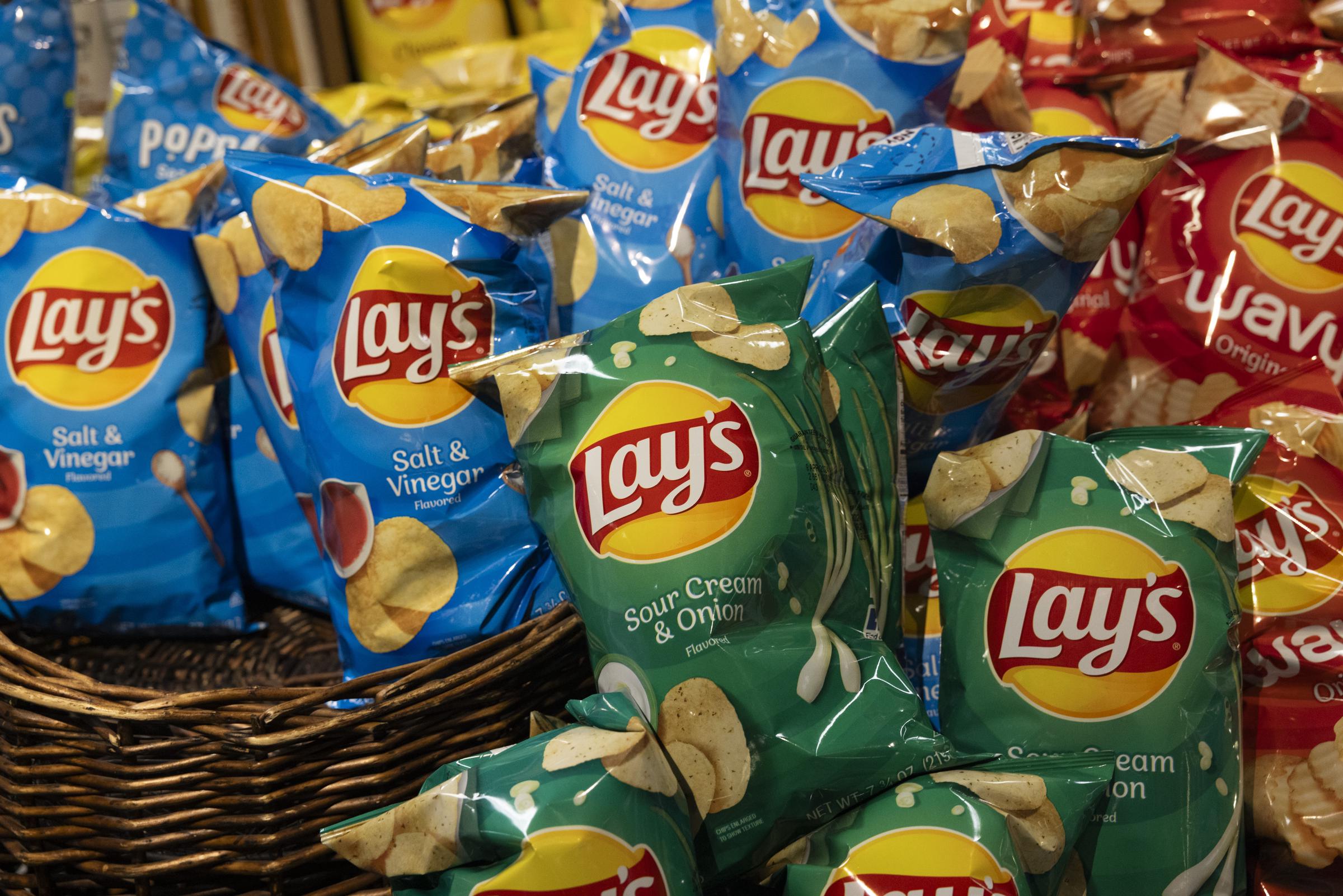
A photo showing a variety of Lay’s chips in a supermarket in Latham, New York on February 2, 2024 | Source: Getty Images
Additionally, affected customers could reach out to Frito-Lay’s Consumer Relations team at 1-800-352-4477 during regular business hours for assistance.
Two days after Frito-Lay announced the recall, the FDA re-published the same details on its official website to further amplify the message and ensure public awareness and safety.
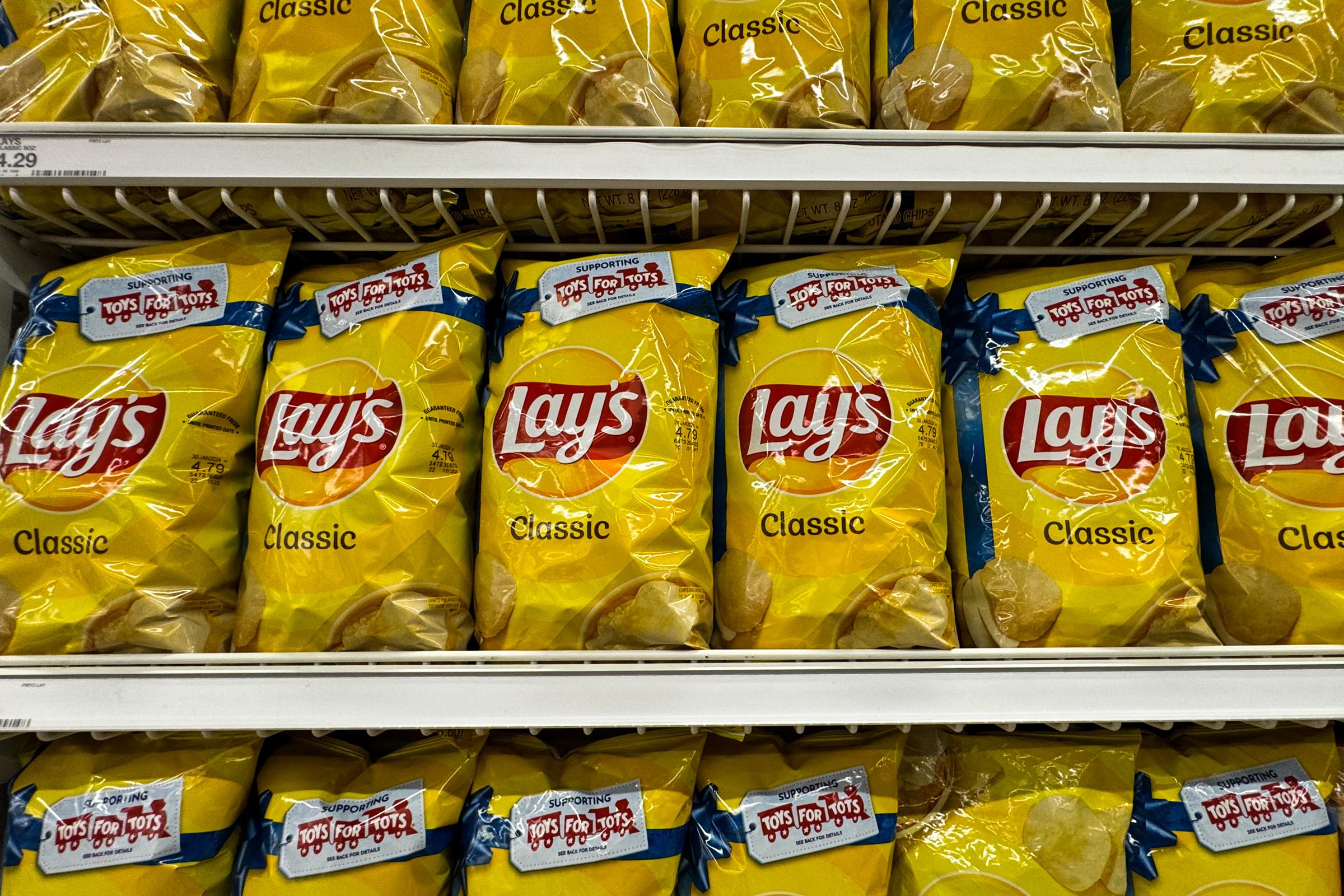
Bags of Lay’s Classic chips in a grocery store in Las Vegas, Nevada on November 17, 2023 | Source: Getty Images
According to the Mayo Clinic, milk allergy ranked among the most common food allergies in children and resulted from an abnormal immune system response to milk proteins.
While cow’s milk triggered most reactions, milk from other mammals, such as sheep, goats, and buffalo, also caused allergic responses.

Jersey cows in a field located in Fresno, California on June 14, 2024 | Source: Getty Images
These reactions would occur because the immune system mistakenly identified specific proteins in milk — such as casein, found in the curd, or whey, found in the liquid portion — as harmful. This would release histamines and other chemicals, causing a range of symptoms.
The Mayo Clinic also stated that milk allergy symptoms could appear within minutes or take hours to develop after consuming milk or milk-containing products. Immediate reactions might include hives, swelling of the lips or throat, wheezing, coughing, vomiting, or an itchy or tingling sensation around the mouth.
Delayed symptoms could include digestive issues such as loose stools, abdominal cramps, or colic in infants and respiratory symptoms like a runny nose or watery eyes.
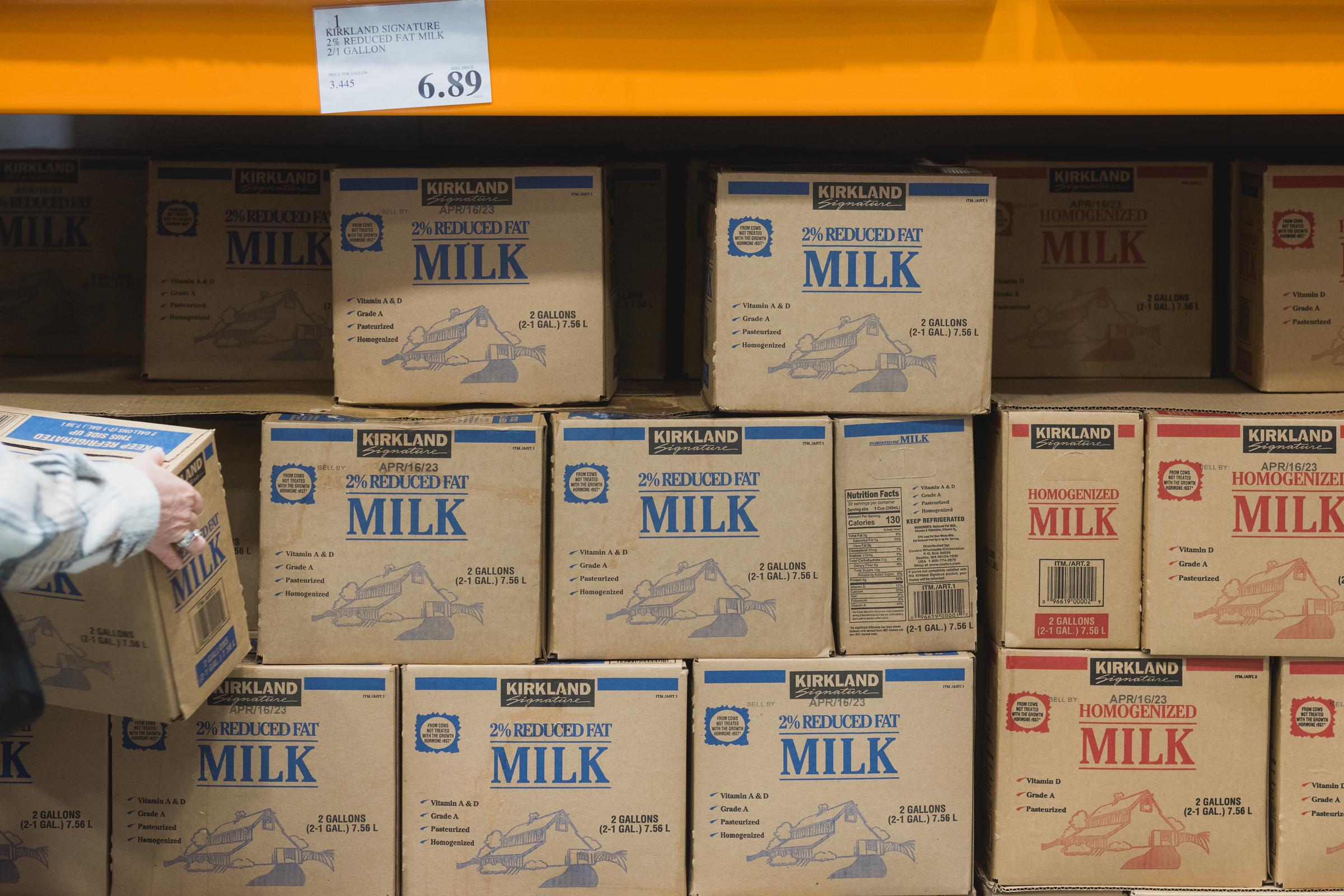
Boxes of milk at a Costco Wholesale store in Kyle, Texas on March 30, 2023 | Source: Getty Images
In severe cases, milk allergies may trigger anaphylaxis — a life-threatening reaction that narrows the airways and makes breathing difficult. Symptoms of anaphylaxis include a swollen throat, a sharp drop in blood pressure, facial flushing, and even shock.
Immediate treatment with an epinephrine injection followed by a trip to the emergency room is essential in such situations.
When unpacking adverse reactions to milk, it’s important to distinguish a true milk allergy from lactose intolerance or milk protein intolerance, as they are fundamentally different conditions.
Unlike a milk allergy, which involves the immune system, lactose intolerance is a digestive issue caused by the body’s inability to break down lactose, a sugar in milk. Symptoms of lactose intolerance, such as bloating, gas, and diarrhea, are typically less severe and do not pose the same risks as a milk allergy.
Several factors increase the likelihood of developing a milk allergy. For example, children with atopic dermatitis — a chronic inflammatory skin condition — are more prone to food allergies, including milk. A family history of allergies such as asthma, hay fever, or eczema raises the risk.
Moreover, milk allergies are most common in young children, as their digestive systems are still developing. Fortunately, many children outgrow the allergy as they age, though some carry it into adulthood.
Regarding treatment, there is no cure for milk allergies, but avoiding milk and milk-containing products is the most effective way to prevent allergic reactions.
This can be challenging, as milk proteins are often hidden in processed foods, baked goods, candies, and even non-dairy-labeled items. However, key terms like “casein,” “whey,” or “lact-” (such as lactose or lactate) on food labels signal the presence of milk proteins.
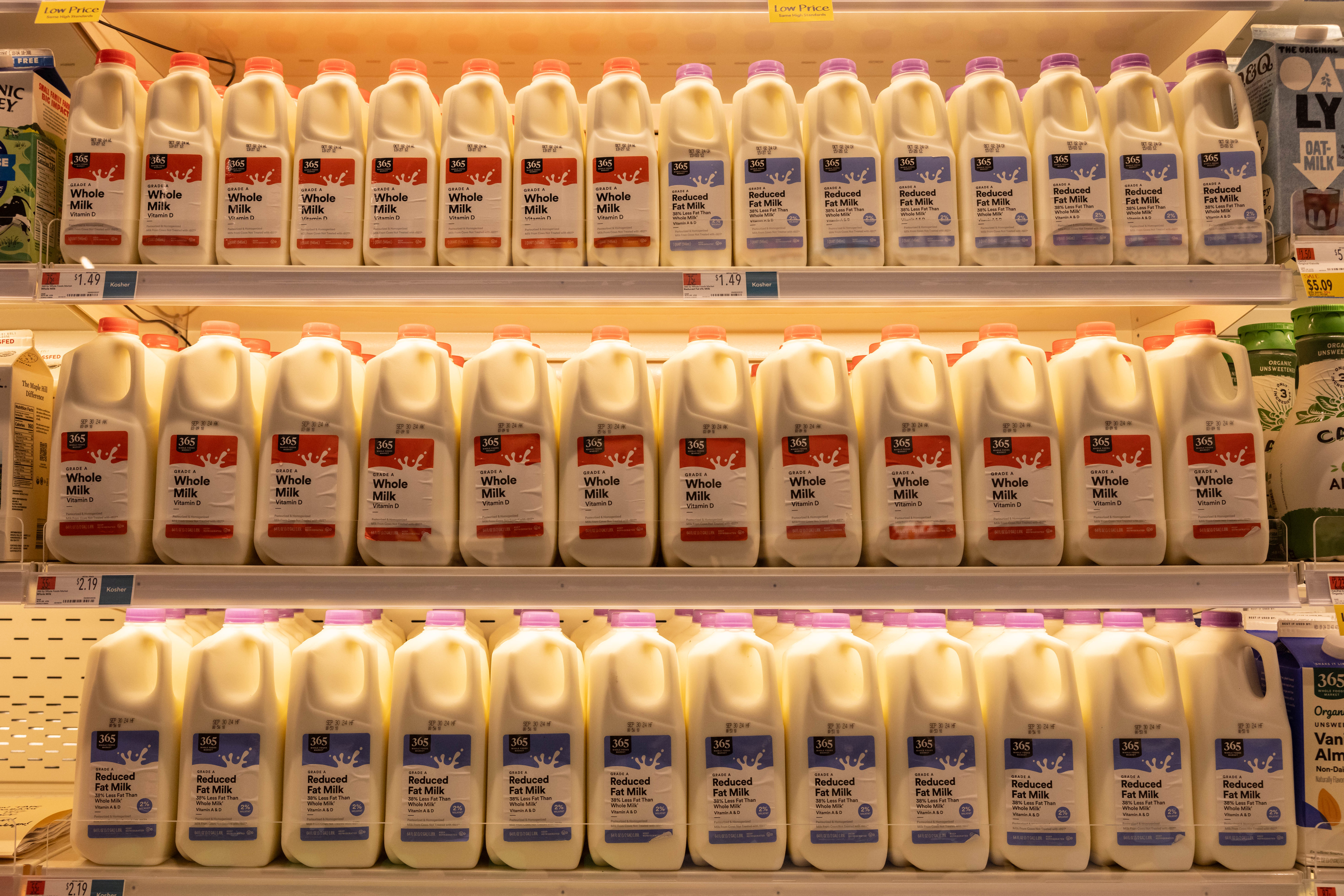
Bottles of milk for sale in a Whole Foods Market Daily Shop in New York on September 17, 2024 | Source: Getty Images
Parents and caregivers of children with milk allergies need to be particularly vigilant. For infants, breastfeeding or hypoallergenic formulas are recommended, as traditional milk-based formulas may trigger reactions.
If breastfeeding, mothers may need to eliminate dairy from their own diets if cow’s milk proteins pass through breast milk and cause symptoms in their babies.
Additional management tips include asking about food preparation in restaurants, which is vital, as foods like seafood or steak might be prepared with butter, which could lead to accidental exposure.
For those at risk of severe reactions, carrying emergency epinephrine, such as an EpiPen, is essential. Wearing a medical alert bracelet or necklace can also help inform others of the allergy in emergencies.
Living with a milk allergy can significantly impact quality of life. Dietary restrictions may lead to nutritional deficiencies, particularly in calcium, vitamin D, and other nutrients in milk.
Thus, consulting a healthcare provider or dietitian can help individuals plan balanced meals and consider supplements to fill these nutritional gaps.
Additionally, the stress of avoiding milk exposure can take a toll on individuals and families, as milk is present in many everyday foods. However, with proper education, planning, and vigilance, most people with milk allergies can lead safe and healthy lives.


